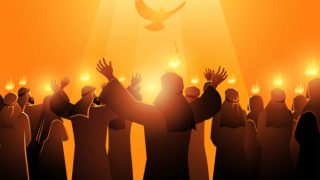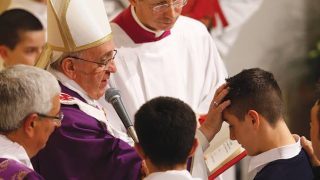
THE FEAR OF THE FUTURE
HOMILY FOR THIRTY-SECOND SUNDAY IN ORDINARY TIME, YEAR
The fear of the future has hindered and restricted so many Christians from the virtue of generosity in which the virtue of hospitality is embedded. This fear has lured so many to preserve and hoard their belongings to themselves alone. There is no way we can be generous if we continue with the fear of how to survive tomorrow by leaving God out of our plans. This is where our trust in Divine Providence comes in as seen in the liturgy of today.
The first reading presents to us the encounter of the prophet Elijah with the widow of Zarephath. Truly, to some persons, the fear of the future has become the greatest enemy of generosity and prosperity. In this reading, Elijah tested her generosity and trust in divine providence. She was indeed an extremely poor widow that did not even have sticks to cook. She was gathering ‘firewood’ to prepare her last meal for herself and her son, after which they would wait to die. Have you been in such a situation before? Have you come to the end of your resources that you no longer have money, no food, no friends, nor health, no shelter, no clothing and practically nothing at all to live on? If yes, you can seek solace from this story and if no, you have more reasons to be grateful.
In her situation, one would expect Elijah to give her something just as some poor persons come expecting their priests and pastors to do. Rather, Elijah made a request based on an unusual faith saying, “Bring me a little water in a vessel that I may drink.” Requesting for more he said, “Bring me a morsel of bread in your hand.” These were the earthly things she initially looked up to, that is why she said, “…that we may eat and die.” Invariably, when we pin our faith on earthly things, we will lose hope in times of difficulties. However, when our faith is hinged on God and we put Him first as she did, God will never fail us. It was through faith that Elijah declared God’s faithfulness saying, “Fear not, go and do as I have said… the jar of the meal shall not be spent, and the pitcher of oil shall not fail…” This was God’s first word to the widow through Elijah. Her present crisis rightly made her afraid, and God wanted her to put away fear and replace it with trust in Him and so she gave at a great risk, based on her trust in the promises of God. Indeed, the words of the prophet came through in the widow’s life and she lacked nothing afterwards. Her faith and trust in God’s words and in Divine Providence never failed her. Rather, she had a transformation story and all things turned around for her good.
The Gospel also presents to us a similar event as Jesus condemns the hypocrisy of the Scribes who devour widows’ houses and in pretence make long prayers. The Scribes sin against the weak and the vulnerable, extort from them, yet carry themselves as religious people. Their relationship with God was more of a show than substance, which was obvious when contributing to the treasury. In view of this, today’s Psalm says, “The Lord upholds the orphan and the widow, but thwarts the path of the wicked.” While the Scribes do this, Christ observes the generosity of the poor widow, who gave everything she had. Many rich people put in large sums into the treasury but the widow put in two copper coins, which make a penny. Invariably, Christ is saying to us, that we give not because we have extra or excess as some will do in attempt to create space in their rooms or wardrobes, but because it is sacrificial and makes us trust in Divine Providence.
Both the widow in the first reading and in the gospel offered some sacrifices in order to experience the bountiful blessings of God. The widow of Zarephath was a woman of faith, who sacrificed her last meal for a stranger she did not know. She gave the little she had before the multiplication of the morsel and the oil. The widow in the Gospel, out of her poverty gave her last penny. This is to teach us that the grace of God does not choose men to sleep and wake up in heaven, nor choose them to live in sin and find themselves absolved at the last day; nor choose them to stay without studying and expect them to pass exams. It does not choose them to be idle and go about their own worldly business, and yet to win a reward at last for which they never toiled. Ah, no oo! The grace of God calls us first to repentance, to a life of holiness, to the culture of generosity, hospitality and to put our trust in Divine Providence, not on our wealth. With these, we experience God’s abundant blessings.
In view of the above, the second reading tells us that God was in the first place generous to us when he gave us His Son Jesus Christ, who trusted the Father so much and offered himself once to bear the sins of many.
In a nutshell, Pope Francis urges us on generosity when he said, “One is not too poor that he cannot give and one is not too rich that he cannot receive.” While giving, let us take away the fear of how we will survive tomorrow. It does not in any way negate a life of planning but uphold our dependence solely on God and in giving, we shall receive in good measures.
Happy Sunday!
Fr. Ken Dogbo, OSJ










